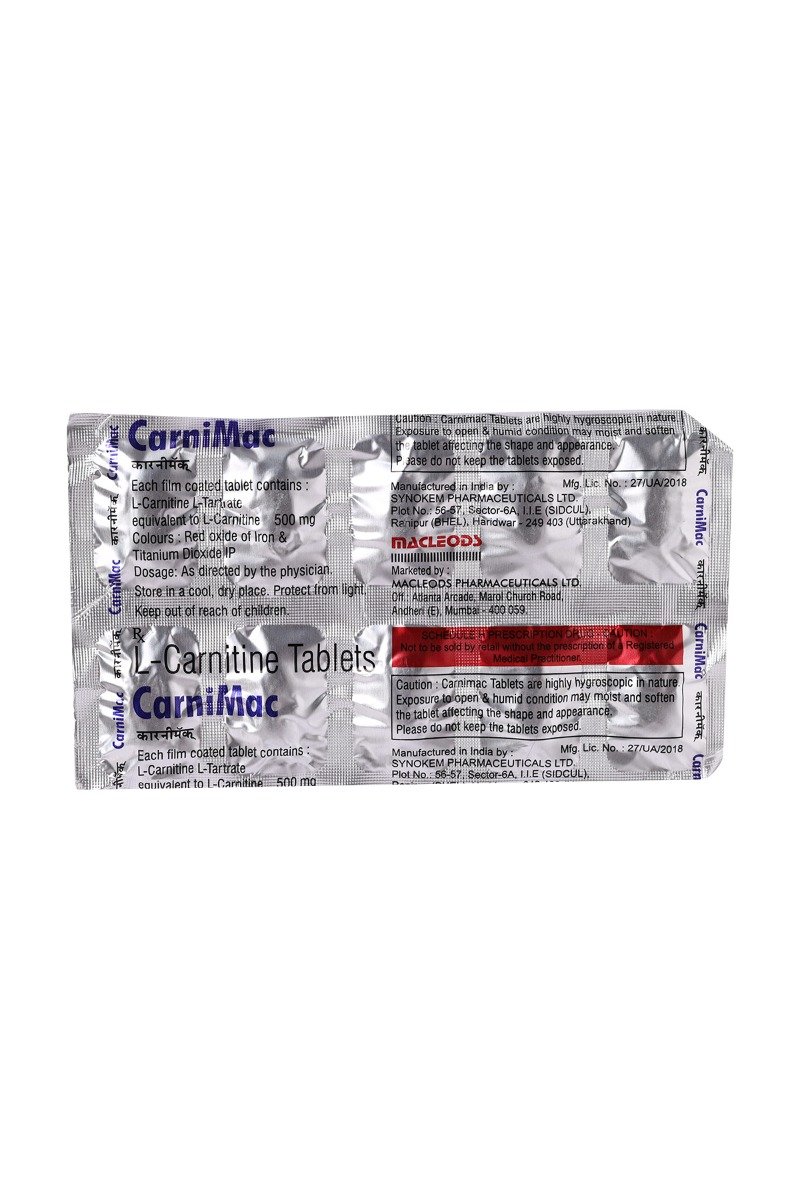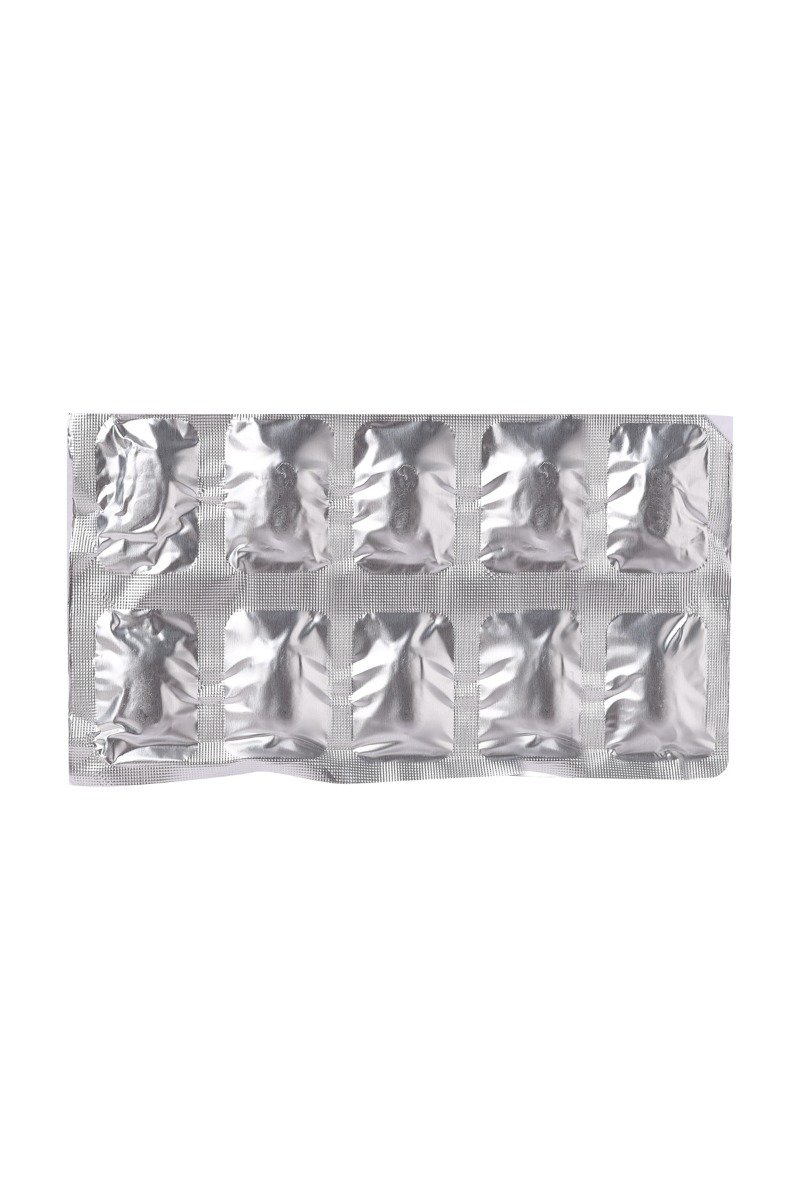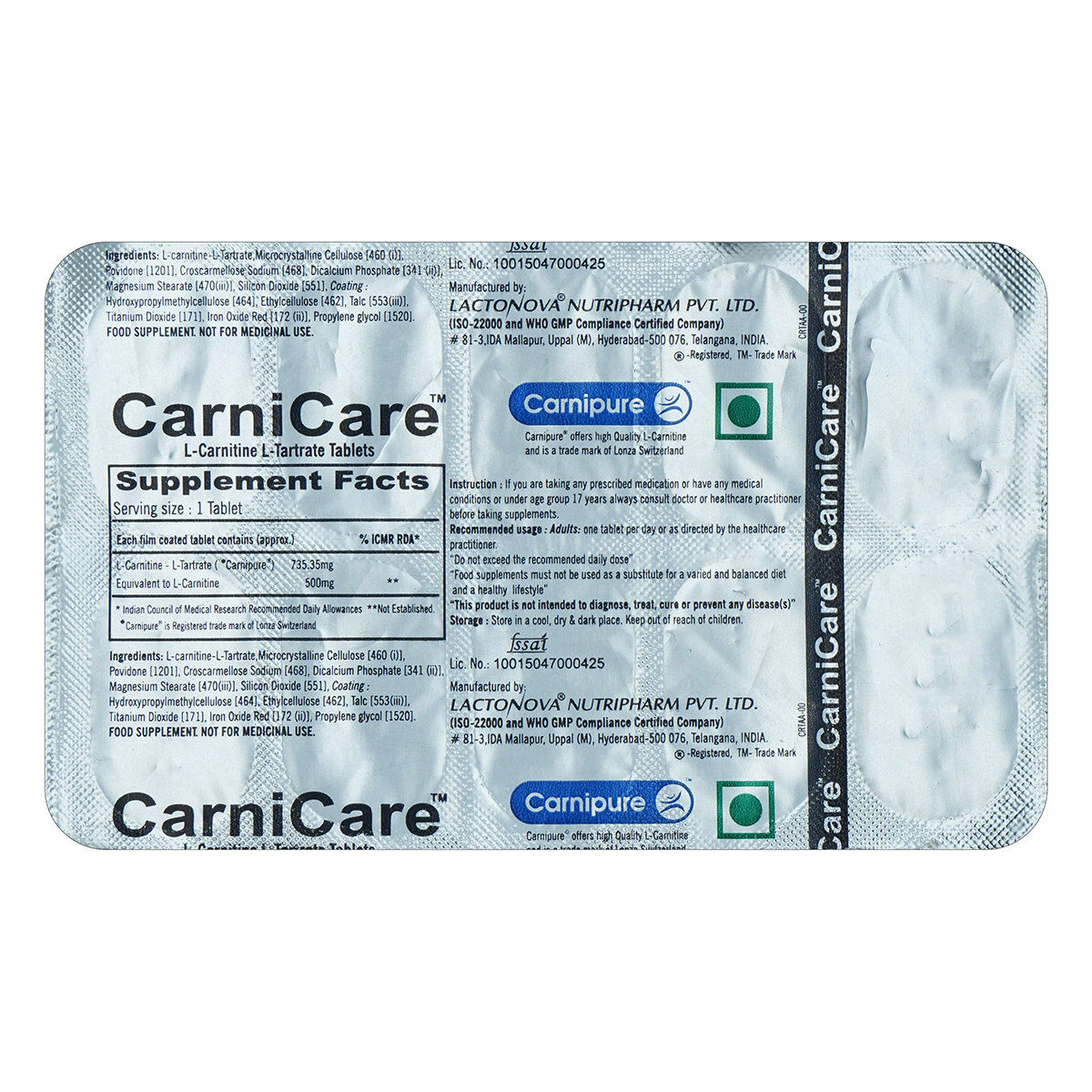Carnimac Tablet 10's
MRP ₹242
(Inclusive of all Taxes)
₹36.3 Cashback (15%)
Provide Delivery Location
Online payment accepted
 Prescription drug
Prescription drugWhats That
Composition :
Manufacturer/Marketer :
Consume Type :
Expires on or after :
Return Policy :
About Carnimac Tablet
Carnimac Tablet belongs to the class of 'nutraceutical products', primarily used to treat carnitine deficiency. Carnitine deficiency is a metabolic muscle disease caused by low levels of carnitine. Carnitine is an amino acid that helps in the production of energy from fatty acids. Symptoms of carnitine deficiency include weakness in the muscles of hips, shoulders, upper arms and legs, low blood sugar, fatigue, vomiting, abdominal pain, growth retardation and low weight.
Carnimac Tablet contains L-Carnitine or Levo-carnitine, a naturally occurring derivative of the amino acids, lysine and methionine. When taken as a supplement, the body converts L-Carnitine into acetyl-L-carnitine and propionyl-L-carnitine. These products further help the body to produce energy from fat.
Your doctor will decide the dosage based on your medical condition. Sometimes, Carnimac Tablet may have common side effects like stomach pain, nausea, vomiting, and diarrhoea. These side effects do not require medical attention and gradually resolve over time. However, if these side effects persist for a longer time, please seek medical advice.
Let your doctor know if you are using prescription, non-prescription drugs and herbal products before starting Carnimac Tablet . If you are known to be allergic to Carnimac Tablet or its inactive components, please inform your doctor. Please tell your doctor if you have an underactive thyroid (hypothyroidism), liver or kidney diseases, diabetes, fits, and dialysis treatment. If you are a pregnant or breastfeeding mother, please consult your doctor before taking Carnimac Tablet . Carnimac Tablet is not recommended for children under 12 years of age.
Uses of Carnimac Tablet
Directions for Use
Key Benefits
Carnimac Tablet is used to treat primary and secondary carnitine deficiency. It contains L-Carnitine or Levo-carnitine, a naturally occurring derivative obtained from amino acids, lysine and methionine. When the body lacks the carnitine, Carnimac Tablet helps in replacing those low levels. Carnimac Tablet is further converted into acetyl-L-carnitine and propionyl-L-carnitine in the body. These products further help the body to produce energy from fat. Carnimac Tablet also plays a role as a water-soluble vitamin, antilipemic drug (lowers blood cholesterol), and a nootropic agent (improve cognitive function).
Storage
- Inform your doctor about the nausea and discuss possible alternatives to the medication or adjustments to the dosage.
- Divide your daily food intake into smaller, more frequent meals to reduce nausea.
- Opt for bland, easily digestible foods like crackers, toast, plain rice, bananas, and applesauce.
- Avoid certain foods that can trigger nausea, such as fatty, greasy, spicy, and smelly foods.
- Drink plenty of fluids, such as water, clear broth, or electrolyte-rich beverages like coconut water or sports drinks.
- Use ginger (tea, ale, or candies) to help relieve nausea.
- Get adequate rest and also avoid strenuous activities that can worsen nausea.
- Talk to your doctor about taking anti-nausea medication if your nausea is severe.
- Record when your nausea occurs, what triggers it, and what provides relief to help you identify patterns and manage your symptoms more effectively.
- Preventing Vomiting (Before it Happens)
- Take medication exactly as prescribed by your doctor. This can help minimize side effects, including vomiting.
- Having a small meal before taking your medication can help reduce nausea and vomiting.
- Talk to your doctor about taking anti-nausea medication along with your prescribed medication.
- Managing Vomiting (If it Happens)
- Try taking ginger in the form of tea, ale, or candy to help alleviate nausea and vomiting.
- What to Do if Vomiting Persists
- Consult your doctor if vomiting continues or worsens, consult the doctor for guidance on adjusting your medication or additional treatment.
- Inform Your Doctor: Notify your doctor immediately about your diarrhoea symptoms. This allows them to adjust your medication or provide guidance on managing side effects.
- Stay Hydrated: Drink plenty of fluids to replace lost water and electrolytes. Choose water, clear broth, and electrolyte-rich drinks. Avoid carbonated or caffeinated beverages to effectively rehydrate your body.
- Follow a Bland Diet: Eat easy-to-digest foods to help firm up your stool and settle your stomach. Try incorporating bananas, rice, applesauce, toast, plain crackers, and boiled vegetables into your diet.
- Avoid Trigger Foods: Steer clear of foods that can worsen diarrhoea, such as spicy, fatty, or greasy foods, high-fibre foods, and dairy products (especially if you're lactose intolerant).
- Practice Good Hygiene: Maintain good hygiene to prevent the spread of infection. To stay healthy, wash your hands frequently, clean and disinfect surfaces regularly, and avoid exchanging personal belongings with others.
- Take Anti-Diarrheal Medications: If your doctor advises, anti-diarrheal medications such as loperamide might help manage diarrhoea symptoms. Always follow your doctor's directions.
- Keep track of your diarrhoea symptoms. If they don't get better or worse or are accompanied by severe stomach pain, blood, or dehydration signs (like extreme thirst or dark urine), seek medical help.
- Include iron-rich foods like dark leafy vegetables, lean red meat, legumes and fish in your diet.
- Consume vitamin C-rich foods as they aid iron absorption.
- Limit tea, cocoa, and coffee as these can slow iron absorption.
- Exercise regularly; however, do not overdo it.
- Inform your doctor immediately if you experience a fever after starting a new medication.
- Your doctor may adjust your medication regimen or dosage as needed to minimize fever symptoms.
- Monitor your body temperature to monitor fever progression.
- Drink plenty of fluids, such as water or electrolyte-rich beverages, to help your body regulate temperature.
- Get plenty of rest and engage in relaxation techniques, such as deep breathing or meditation, to help manage fever symptoms.
- Under the guidance of your doctor, consider taking medication, such as acetaminophen or ibuprofen, to help reduce fever.
- If your fever is extremely high (over 103°F), or if you experience severe symptoms such as confusion, seizures, or difficulty breathing, seek immediate medical attention.
- Hydrate your body: Drink enough water to prevent dehydration and headaches.
- Calm Your Mind: Deep breathing and meditation can help you relax and relieve stress.
- Rest and Recharge: Sleep for 7-8 hours to reduce headache triggers.
- Take rest: lie down in a quiet, dark environment.
- Cold or warm compresses can help reduce tension.
- Stay Upright: Maintain good posture to keep symptoms from getting worse.
- To treat headaches naturally, try acupuncture or massage therapy.
- Over-the-counter pain relievers include acetaminophen and ibuprofen.
- Prescription Assistance: Speak with your doctor about more substantial drug alternatives.
- Severe Headaches: Seek emergency medical assistance for sudden, severe headaches.
- Frequent Headaches: If you get reoccurring headaches, consult your doctor.
- Headaches with Symptoms: Seek medical attention if your headaches include fever, disorientation, or weakness.
- Stay hydrated by drinking plenty of water.
- Avoid dairy product such as cheese, milk, yogurt and ice cream.
- Maintain healthy weight and exercise daily.
- Following a low-calcium diet can help reduce hypercalcemia symptoms.
Drug Warnings
Let your doctor know if you are using prescription, non-prescription drugs, and herbal products before starting Carnimac Tablet . Inform your doctor if you are allergic to Carnimac Tablet or its inactive components. Please inform your doctor if you have underactive thyroid (hypothyroidism), liver or kidney diseases, diabetes, and fits. Inform your doctor if you need to undergo dialysis treatment before starting Carnimac Tablet . Pregnant or breastfeeding women should consult their doctor before taking Carnimac Tablet . Keep Carnimac Tablet away from direct sunlight. Do not store Carnimac Tablet above 25°C and keep it away from direct sunlight.
Drug-Drug Interactions
Drug-Drug Interactions
Login/Sign Up
Drug-Food Interactions
Drug-Food Interactions
Login/Sign Up
Diet & Lifestyle Advise
- Try food sources like milk, cheese, eggs, liver and kidney, chicken, red meat, tuna, mackerel, and salmon, shellfish, oysters, clams, dark green vegetables, such as spinach and kale, beets, avocados, and potatoes, whole grains, cereals, kidney beans, black beans, and chickpea.
- Include fruits like citrus, banana, and watermelon in your diet.
- Avoid smoking and alcohol consumption.
- Exercise regularly and maintain a healthy lifestyle.
- Avoid excess fatty foods.
Side Effects of Carnimac Tablet
- Stomach pain
- Nausea
- Vomiting
- Diarrhoea
Habit Forming
Therapeutic Class
All Substitutes & Brand Comparisons
RX
Out of StockCarnivit 500 mg Tablet 10's
Sun Pharmaceutical Industries Ltd
₹146.5
(₹12.89 per unit)
40% CHEAPERRX
Out of StockCarnicare Tablet 10's
Lactonova Nutripharm Pvt Ltd
₹210
(₹18.9 per unit)
13% CHEAPERRX
Out of StockCarniglow Tablet 10's
Owshadh Pharmaceuticals
₹220
(₹19.8 per unit)
9% CHEAPER
Author Details
We provide you with authentic, trustworthy and relevant information
Drug-Diseases Interactions
Drug-Diseases Interactions
Login/Sign Up
FAQs
Drug-Drug Interactions Checker List
- WARFARIN
- ACENOCOUMAROL
Special Advise
Let your doctor and the laboratory staff know if you are using Carnimac Tablet since it may interfere with laboratory tests.
Disease/Condition Glossary
Carnitine deficiency is a metabolic muscle disease caused by low levels of carnitine. Carnitine is an amino acid that helps in the production of energy from fatty acids. Carnitine deficiency can be primary and secondary. Primary carnitine deficiency occurs due to a genetic mutation in the substance responsible for bringing the carnitine into the cells. Secondary carnitine deficiency occurs when there is not enough carnitine in the blood. Symptoms of carnitine deficiency include weakness in the muscles of hips, shoulders, upper arms, and legs, low blood sugar, fatigue, vomiting, abdominal pain, growth retardation, and low weight.

Have a query?
Alcohol
Safe if prescribed
It is advised to limit the alcohol intake while using Carnimac Tablet .
Pregnancy
Consult your doctor
Carnimac Tablet should be used only when recommended by your doctor during pregnancy. Let your doctor know if you are pregnant or planning to conceive before taking Carnimac Tablet .
Breast Feeding
Consult your doctor
It is not known if Carnimac Tablet is excreted into breast milk. Please consult your doctor before taking Carnimac Tablet if you are breastfeeding.
Driving
Safe if prescribed
No interaction found/established.
Liver
Consult your doctor
Let your doctor know if you have any history of liver diseases before taking Carnimac Tablet . Dose adjustment may be required.
Kidney
Consult your doctor
Let your doctor know if you have any history of kidney diseases before taking Carnimac Tablet . Dose adjustment may be required.
Children
Safe if prescribed
Carnimac Tablet is not recommended for children below 12 years of age.











